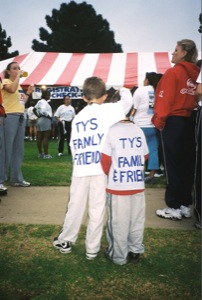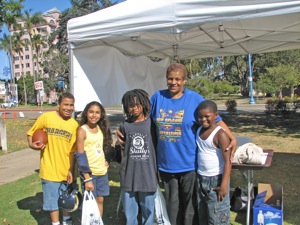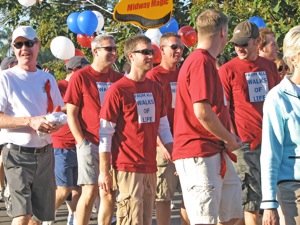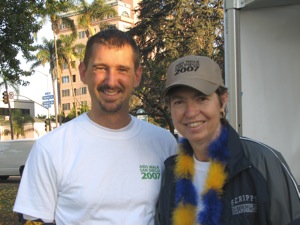feature
In the Wake of Devastating State Budget Cuts, AIDS Walk San Diego Marks 20th Anniversary
Published Thursday, 24-Sep-2009 in issue 1135
For years, San Diego’s HIV/AIDS service organizations have managed to serve an increasing number of clients with dwindling resources. Government and other funding has consistently failed to keep pace with the increased demand. And this year, HIV/AIDS service organizations throughout California were dealt a devastating blow when more than $52 million was line-item vetoed out of the state budget for the Office of AIDS.
This funding loss will significantly impact some of the San Diego area’s most important HIV/AIDS programs and services, and brings a renewed urgency to this year’s 20th annual AIDS Walk San Diego.
Locally, more than $1 million will be lost from funding streams that cover HIV testing and counseling, as well as viral load testing, a vitally important process that allows physicians to best treat those living with HIV/AIDS.
“This loss in funding is a huge setback in our local fight against this disease. We have lost precious prevention dollars, as well as funding for the care of those most in need,” said John de Miranda, chief executive officer of Stepping Stone. “Unless we pull together now to muster all the resources we can to overcome these losses, I believe we will see the impacts of these in truly dire ways.”
“Now more than ever, with enormous budget cuts to HIV prevention, care and treatment, the gaps in service are growing,” said Sheri Kirshenbaum, Ph.D., clinical director of HIV Services for Jewish Family Service of San Diego. “Although AIDS Walk will not be able to fill all of these gaps, it is imperative for all of us to remain involved and keep these monies coming into our community.”
“Every 9? minutes, someone new is infected with HIV. Clearly the HIV/AIDS epidemic is not over and this year every dollar matters more than ever,” said Robert Lewis, director of HIV services for Family Health Centers of San Diego (FHCSD). “More than 25 local San Diego agencies depend on AIDS Walk and the HIV Funding Collaborative funds to provide vital services to San Diegans living with HIV/AIDS, and this year those funds are more needed than ever.”
“We are still trying to fully understand the impact these budget cuts will have on San Diego’s HIV/AIDS programs,” said Rosana Scolari, director of CASA South Bay, a program of the San Ysidro Health Center. “What we do know is that they will cripple many of the services that we have built to help those most distressed by this disease.
“As we try to find funding to cover viral load testing, HIV testing and counseling, there will be shortfalls in many other kinds of HIV/AIDS service programs,” said Dr. Delores A. Jacobs, chief executive officer of The San Diego LGBT Community Center. AIDS Walk San Diego is a program of The Center. “I hope everyone will join us for AIDS Walk this year. It is a concrete way to help many of the agencies that directly serve people living with HIV in our area.”
Then and Now
In 1989, the first “official” AIDS Walk San Diego stepped off and while painful losses were coming fast and furious, there was still a sense of hope that a cure would come quickly.
The ’89 Walk was the first time AIDS was part of the name of the event – two years before, the event took place as the Walk for Life. It was still a time when the stigma associated with the disease was so profound that people hid their diagnoses and organizers didn’t feel the word AIDS could be part of the event’s name.
That stigma and fear may have kept some from participating in the event’s early years, but then – as now – courageous and dedicated individuals and teams have dedicated themselves not just to participating, but to helping in a myriad of ways to ensure the success of the event and support for its benefiting organizations.
And while the stigma associated with participating in the event has lessened significantly, service providers note that it still exists for those actually living with the disease.
“Participating in AIDS Walk also assists our community in decreasing the stigma and discrimination that still accompany HIV/AIDS,” said Kirshenbaum. “The Walk is also a visible reminder of the large community support for those living with the virus and the diversity of those infected and affected – the many faces of HIV/AIDS.”
Irene Milton, co-founder of Christie’s Place, agrees. Milton lost her daughter, Christie Milton Torres, to the disease. Christie was the AIDS Walk grand marshal in 1993.
“In the early 1990s, many people were dying,” she said. “With the cuts to the state budget, it feels like we are going back 20 years. HIV/AIDS continues to be stigmatized and many people living with HIV remain isolated.”
Today, AIDS Walk San Diego is the region’s largest one-day HIV/AIDS fundraiser, and is the largest non-government financial provider for HIV/AIDS services in San Diego County. In San Diego, unlike in some other cities, AIDS Walk benefits a multitude of organizations, rather than a single agency. San Diego is also unique in the way it leverages the funds raised through AIDS Walk. Through its partnership with the San Diego HIV Funding Collaborative, the impact of the dollars raised is increased by combining those funds with donations from other philanthropists and foundations to qualify for matching funds.
Since 1989, AIDS Walk San Diego has raised more than $7.5 million, and last year, more than 25 HIV/AIDS service organizations received $550,000 from the Walk.
How AIDS Walk Helps
Family Health Centers is one of those organizations and is the largest comprehensive HIV/AIDS service provider in San Diego County. Over the past nine years, FHCSD has received more than $109,000 from AIDS Walk San Diego. AIDS Walk funding has helped the agency’s Teen Outreach Mobile Clinic to increase its HIV prevention and testing services. The Teen Outreach Mobile Clinic is a collaborative project providing outreach and primary health care services, including STI and HIV testing and counseling, to homeless, run-away and high-risk youth. Two three-hour night-time clinics are offered each week –qq one in Ocean Beach and one in Hillcrest.
“Each year, we provide medical and supportive services to more than 1,400 individuals living with HIV, as well as a wide array of HIV prevention services to those at greatest risk,” said Fran Butler-Cohen, president and CEO of FHCSD. “In addition to HIV testing and counseling, which we offer at all of our clinic sites, we also provide specialized medical and dental care, counseling services and case management for people living with HIV/AIDS, as well as a wide array of programs designed to assist those at greatest risk in building the information and skills they need to prevent the further spread of this disease.
“We depend on the resources from AIDS Walk and the San Diego HIV Funding Collaborative to ensure we can provide these vital services and programs,” Butler-Cohen said. “This year, as we face substantial cuts in government funding, we are even more grateful to all those involved in making AIDS Walk San Diego such a success – they really do make a difference in the lives of our clients.”
And that’s truly what AIDS Walk is all about – making a difference for those impacted by HIV/AIDS. At Mama’s Kitchen, each contribution from AIDS Walk represents thousands of nutritional meals for clients struggling with HIV/AIDS, severe poverty and other critical illnesses.
“This year, Mama’s Kitchen delivered our five millionth meal,” said Alberto Cortés, executive director. “We could not have reached this amazing milestone without the long history of support from AIDS Walk San Diego. The early support our organization received from AIDS Walk gave us credibility, and it would not be an overstatement to say that the grants from AIDS Walk have helped Mama’s Kitchen grow into the organization we are today.”
Mama’s Kitchen is still the only local meal delivery service for people with AIDS that supplies three meals a day for 365 days of the year. Through tough times and rising food costs, Mama’s Kitchen has never turned away anyone who was eligible for their services or maintained a waiting list to get meals, in part due to the generosity of AIDS Walk participants and supporters.
“AIDS Walk San Diego is the most important fundraising event in San Diego,” Cortés said. “Many of our local AIDS service organizations are experiencing large cuts in government funding, making financial support from AIDS Walk more critical than ever. When you support AIDS Walk, you improve the lives of people affected by HIV/AIDS by reducing hunger and homelessness, increasing access to mental health services and other critical social services programs.”
Funds from last year’s walk provided financial support to 26 San Diego area HIV/AIDS service organizations, including:
Acosida Tijuana, A.C.
Alpha Project for the Homeless
Being Alive San Diego
Christie’s Place
Comite Civico del Valle
Community HousingWorks
Deaf Community Services of San Diego
Eunime Por-Tijuana, A.C.
Family Health Centers of San Diego
Fraternity House
Jewish Family Service
Karibu Center for Social Support
and Education
Mama’s Kitchen
North County Health Services
Operation Samahan
Programa Amigo, A.C.
San Diego Hospice
San Diego LGBT Community Center
San Diego Volunteer Lawyer Program
San Diego Youth & Community Services
San Ysidro Health Center
Special Delivery San Diego
Stepping Stone of San Diego
Townspeople
Vista Community Clinic
Womanhaven (Center for Family Solutions)
|
|
Copyright © 2003-2025 Uptown Publications





